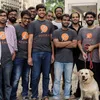NIT Bhopal alumni’s startup is helping non-developers build AI and ML platforms without any coding
Bengaluru-based Mate Labs’ platform Mateverse offers end-to-end automation for building a machine learning and data science model.
As the world moves towards automation, industries and corporates are increasingly adopting newer technologies to ease their work process. But ironically, there are many tasks of a data analyst that are yet to be automated.
This was something Kailash Ahirwar and Rahul Vishwakarma decided to solve. Friends since their NIT Bhopal days, the duo started Mate Labs in 2015 in Bengaluru to bring Artificial Intelligence (AI) and Machine Learning (ML) to the masses.
It’s platform Mateverse offers end-to-end automation for building a machine learning and data science model, especially for non-developers.
As of March 2018, its product had 15,000 signups with over 22 percent of the users belonging to the C-suite.
The journey
According to Kailash and Rahul, they have always been interested in technology and mathematics and that is what got them closer to machine learning.
“We started reading and working on AI and ML-related projects for organisations. While working on these projects, we realised that a large number of corporates were either unsure about how to adopt AI or found the process complicated and tedious,” says Rahul.
This was especially true for non-technology companies and enterprises with resource crunch or someone looking to transform rapidly. Although these companies were keen, the entire process seemed daunting.
“That was the eureka moment for us, the realisation that there was a definite larger industry which needed quick, cost-effective, and easily implementable AI and ML application,” says Rahul.

The Mate Labs Team
How it works?
Using Mateverse, data analysts can build machine learning models without writing any code. According to the team, this will help cut down 90 percent of the time taken in the development of any solution. Rahul says, it also enables non-data scientists to develop and build the analytical models.
“Our product, Mateverse, is used by CXOs and VPs, data analytics firms, analysts, and data scientists from across sectors including Fortune 500 companies. Our one-of-a-kind offering gives us the competitive advantage of being able to target customers who weren’t until now from the incumbents of this space. We built this platform through their proprietary technology, which makes the automation possible,” says Rahul.
Explaining how the product works, he says the lifecycle of a data science model includes data ingestion, data preparation, data pre-processing, data cleaning, feature engineering, model training, and deployment.
Mateverse’s proprietary algorithms cover the lifecycle of the predictive analysis model. It automates the time-consuming aspects of data cleaning leading all the way to feature engineering and model training.
The platform works like a simple drag and drop model. Once you integrate the database and go to the data preparation step, you can use the existing data tables in the database to build out the data set.
“Whenever you are building an ML model, the attributes are spread out multiple models, and you need to bring the attributes to one place. How you do that is bring multiple tables and create a hybrid data set, and you go on to do data cleaning, data pre-processing and other manual ops. With Mateverse, once you upload the data, you get a trained ML model in a few minutes,” says Rahul.
In short, the work that used to take anywhere between nine to 15 months earlier, now happens in just three weeks. Through Mateverse, teams are able to augment businesses and equip organisations with tools to train ML and Deep Learning Models, in addition to helping them solve nuances around handling and controlling their data.
Challenges and numbers
For the team, one of the major challenges was setting up the framework of “Democratising ML”. According to Rahul and Kailash, when they started working on Mate Labs, there was no one in the market to look up to who was trying to bring ML to the general masses.
“With modest resources, we moved step by step from Alpha to Beta and now the V1.0 carefully learning and relentlessly iterating from our own users over the course of time. Now we have one of the most complete solutions available across the ecosystem,” says Rahul.
As of March 2018, it also raised $550,000 from angel investors. In January 2019, the team released the full-fledged enterprise version of Mateverse with applications for patents.
“In the past four months, we have onboarded six enterprise customers across sectors like pharmaceutical, SaaS, FMCG, etc,” says Rahul. The team follows a SaaS-based business model where clients engage with the team based on computational usage or usage per licence.
“Once we have identified a client and understood their business need, we work on a 15-day pilot before moving into a long-term partnership. The pilot phase works beneficial for both parties to gauge, course correct, and better align our goal,” says Rahul. The team follows annual contract models between $20,000 to $200,000.
The sector and future plans
Do-it-yourself models are fast-growing in AI. There are startups like Jubi.Ai, which automates onsite customer engagement and omnichannel, automate sales and customer service with the help of bots.
There is also Actionable Science, which builds AI-powered "virtual people", which makes it easy for enterprise support teams to improve productivity, enhance customer experiences, increase employee satisfaction and lower costs.
But Mate Labs is focussed on automating the data analysis process. In future, besides the democratisation of ML at an ecosystem level, the startup wants to expand its target market and capture a larger share of the AI/ML market. It also plans to hire more people and increase the team strength.
The startup was also recently recognised for its unique offering. Speaking about which, Rahul says: “We are the only Indian startup to be selected to represent India at Google Demo Day Asia 2019. In a few weeks, we will be looking forward to interacting and networking with some of the world’s best entrepreneurial mind.”
(Edited by Megha Reddy)





![[Tech 30] The journey of Hasura, from a food delivery app to a platform that helps developers b...](https://images.yourstory.com/cs/wordpress/2016/10/hasura-tech30.png?fm=png&auto=format&h=100&w=100&crop=entropy&fit=crop)




